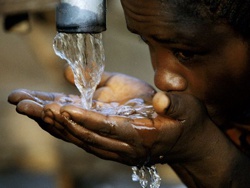An acute water shortage will soon hit Western, Eastern and Greater Accra regions if immediate measures are not put in place to check commercial, small scale and illegal mining activities, Mr. Samuel Obiri, Executive Director, Center for Environmental Impact Analysis (CEIA), a non-governmental organisation, said on Tuesday.
He said mining had gradually washed poisonous chemicals such as sulphur, iron, arsenic and cyanide into many rivers; increased mercury concentration in those rivers. He warns that if care was not taken, most of those rivers would dry up.
Mr. Obiri was speaking at the close of a two-day workshop on Mining and Minerals Act, 2006, (703) in Tema organized by WACAM, a non-governmental organisation.
It was attended by 50 participants made up of assembly members, queen mothers, chiefs, and youth groups drawn from Brong-Ahafo, Eastern and Western regions and aimed at sensitizing them on the Minerals and Mining Act.
Mr. Obiri said rivers such as Pra, Birim and Densu which provide potable drinking water to about 50 percent of the populations in the two regions are gradually drying up because of mining.
He said some river bodies in the Eastern Region, which flow into River Densu, had been contaminated with poisonous chemicals while others had dried up.
Mr. Obiri appealed to District and Municipal Assemblies, traditional rulers, assembly members, civil society and non-governmental organizations to check mining activities in their areas.
He said though some mining companies as part of their social responsibilities drilled a number of boreholes in mining communities, many of those boreholes had been polluted.
Mr. Obiri said research had shown that 177 rivers in Tarkwa and 160 in Obuasi had been destroyed.
He said children in many mining communities had developed skin rashes and other skin and chronic diseases because of the contamination of river bodies in those areas.
Mr. Obiri said residents in mining communities are always prone to diseases such as anaemia, leukemia, typhoid, skin cancer, foot rot and asthma.
He said statistics showed that, by June 2010, 7,002 people had been infected with various skin diseases in Tarkwa and its environs.
Nana Adoma Agyemang, Queen mother of Osino, a mining community in the Eastern Region, confirmed that many of the inhabitants in the community had developed skin rashes and diseases.
Regional News of Wednesday, 7 May 2014
Source: GNA
NGO predicts water shortage in three regions













